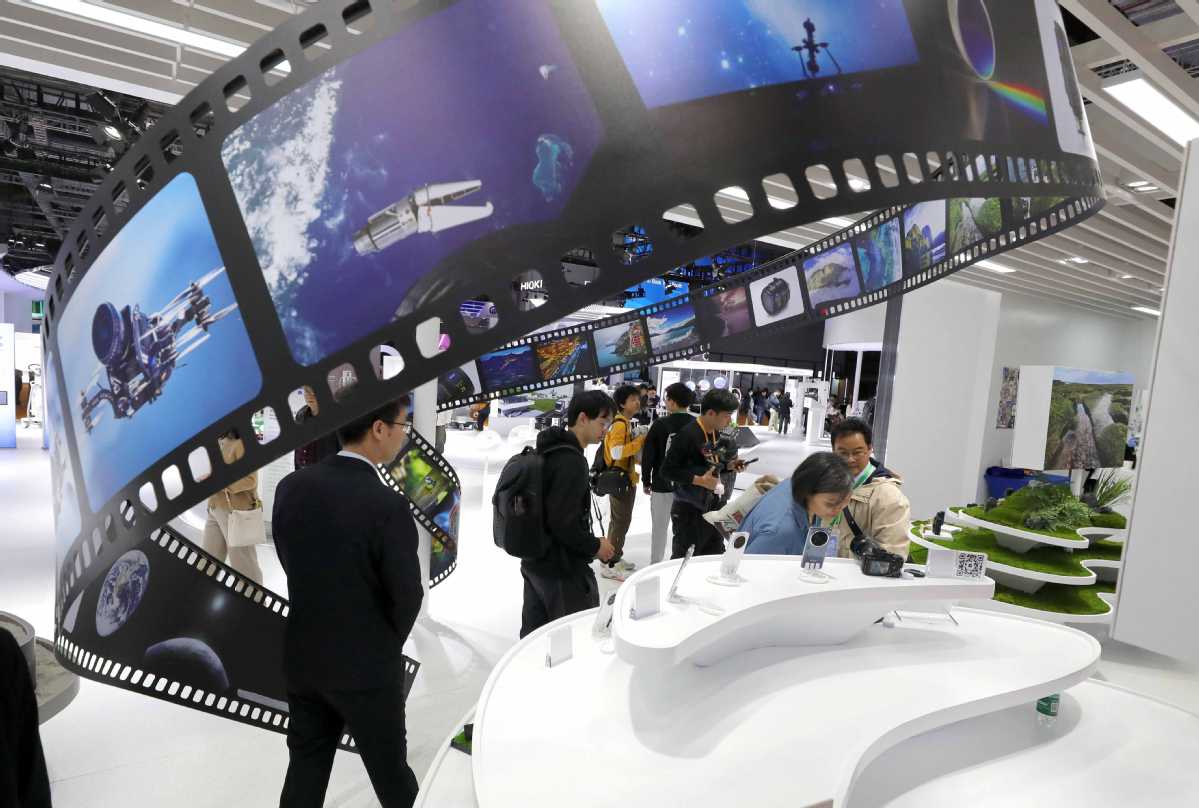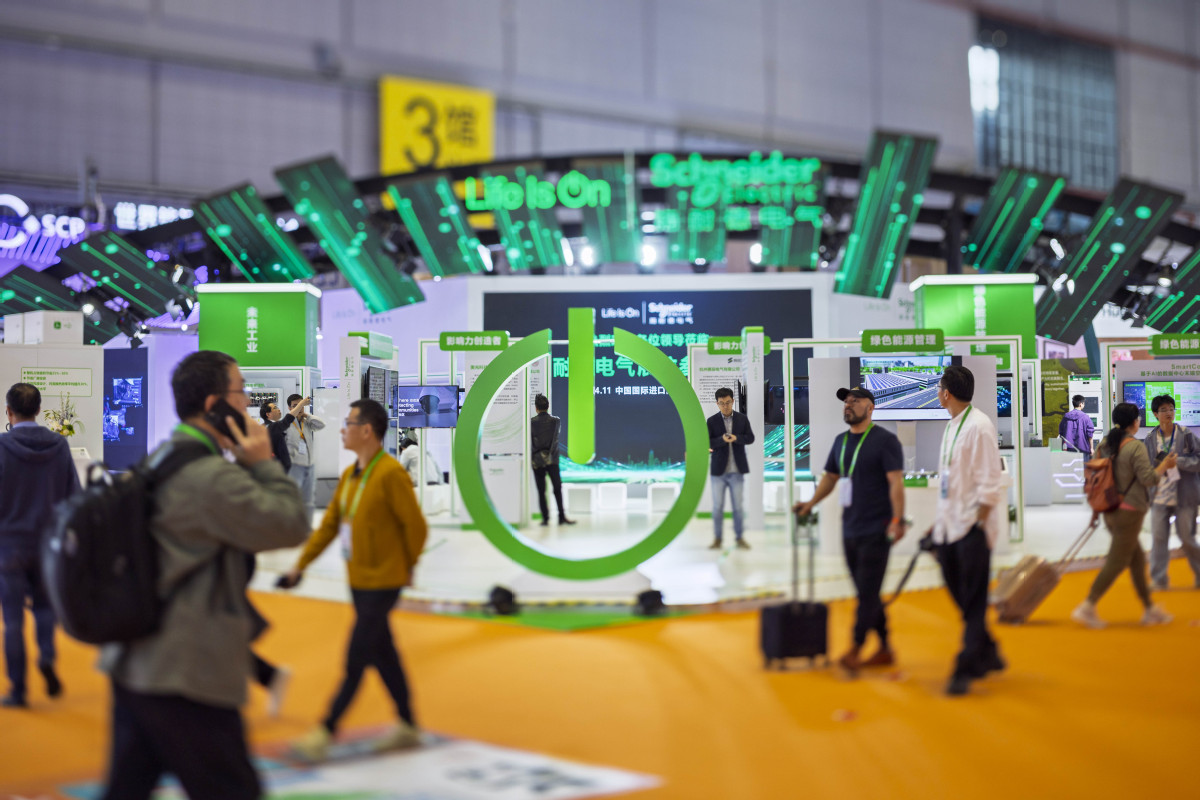China pivotal to MNCs' global biz strategy

Visitors experience lens products from German optical systems company ZEISS Group at its booth during the seventh CIIE in Shanghai on Nov 9. (Photo/Xinhua)
Three or four decades ago, multinational corporations used to take a simple approach while conducting their businesses in China.
They would bring in products that had already succeeded internationally and instruct local factories to produce them for Chinese consumers.
This strategy, backed by the scale and profitability of the Chinese market, proved effective.
As a result, they could gradually expand their presence by establishing additional plants, branches and regional offices within China to maintain a competitive edge.
However, this model no longer fits today's complex business landscape.
A large number of global companies have leaned heavily on the China International Import Expo platform, held annually in Shanghai for seven years now, to showcase their latest products, solutions and services, as well as build connections with new clients in China as well as other countries.
Numerous products and technological solutions making their debuts at the CIIE were developed in their research and development centers in China, showing a clear trend in their investment focus within the country in recent years.
The seventh edition of the CIIE, which was held from Nov 5 to 10, covered an area of over 420,000 square meters and attracted 3,496 exhibitors from 129 countries and regions.
Up to 297 Fortune 500 companies and industry leaders were present at this year's expo, a record high, according to information released by the Ministry of Commerce.
A total of 186 companies and institutions, including French industrial conglomerate Schneider Electric, Swiss food and beverage giant Nestle SA and United States material-science group Dow Inc, have taken part in the CIIE during all seven years.
Highlighting that this grand event has established itself as a premier venue for global product debuts for seven years, Arnold Li, senior vice-president of Ingersoll Rand Inc, a US industrial goods manufacturer and seven-time participant at the CIIE, said the expo has become a key platform for Ingersoll Rand to launch new products.
The company, in fact, held the world premiere of its latest compressor during the expo.
"The Chinese market holds a pivotal position in our global business strategy. As the second-largest economy in the world, China offers immense potential and innovative capabilities, presenting us with numerous opportunities for growth," said Li.
"We firmly believe that the Chinese market is not only a key driver of our current business expansion, but also a core focus of our future strategic layout," he said.
Sectors including healthcare, biotechnology, new energy and automation will be the group's next growth points in China, he added.
Up to 450 new products, technologies and service items made their debuts at this year's CIIE, up from 442 in 2023, said the Ministry of Commerce.
Market watchers and foreign business leaders view this as a strong testament of global companies' confidence in the Chinese market and their commitment to further expansion in the country, despite a sluggish global economic recovery.
Amid the current headwinds to economic globalization, China remains steadfast in advancing reform and opening-up, optimizing the business environment, and continuously working to enhance market transparency, efficiency and market rules.
The government has introduced a series of policies to attract foreign investment, said Dereck Ji, managing partner for China at Belgium-based ADL Consulting.
For instance, the latest edition of China's national negative list for foreign investment, which took effect on Nov 1, has removed the last two manufacturing-related restrictions, further opening the sector to global investors, according to the National Development and Reform Commission.
"As China's manufacturing sector undergoes transformation and upgrading, high-end manufacturing has become a key area for attracting foreign investment," Ji said.
Strategic industries in the manufacturing sector, such as electric vehicles, new materials, intelligent manufacturing, industrial robots, biomedicine and high-performance medical devices, aerospace and high-end equipment manufacturing, offer opportunities for foreign companies to achieve growth through technological cooperation and investment, he added.
Apart from showcasing the latest products and technology solutions at its 600-square-meter booth, Swedish technology group and seven-time CIIE participant Hexagon AB said it plans to deliver more tailored solutions for rapidly expanding sectors such as electric vehicles and commercial aviation to support China's rising demand for high-end manufacturing.
"Collaborating with local partners and startups has been a key part of this strategy, helping us to remain agile and address China's industry needs directly," said Josh Weiss, president of Hexagon's manufacturing intelligence division.

People walk past the booth of French industrial conglomerate Schneider Electric during the seventh CIIE in Shanghai on Nov 9. (Photo/Xinhua)
After establishing empowerment centers in Shanghai and Qingdao, Shandong province, as well as other regions within the country in recent years, the Stockholm-headquartered group is currently building its South China headquarters in Shenzhen, Guangdong province, at an investment of more than 200 million euros ($212.4 million). The facility will be operational by the end of next year.
This will create an "Industry 4.0"demonstration model, including a global "lighthouse factory" and the core resource ecosystem for the entire industrial chain. It will also offer solutions support for clients in Southeast Asia and other Asian countries, said Weiss.
Driven by its institutional opening-up, market size, robust infrastructure, growing innovation strength and talent pool, as well as its status as a "world factory", China's foreign direct investment, in actual use, reached $163.3 billion in 2023, an increase of 176 times compared to $920 million in 1983, data from the Ministry of Commerce showed.
Foreign executives at the CIIE often express "long-term confidence in China", grounded in the country's stable economic fundamentals and the consistent trajectory of steady growth in the world's second-largest economy, said Liu Tao, a researcher specializing in market economy studies at the State Council's Development Research Center.
Despite a high benchmark set in the previous year, China's economy posted a year-on-year growth rate of 4.8 percent in the first three quarters, surpassing that of many other major global economies, according to the National Bureau of Statistics.
By Nov 10, companies had already signed up for over 100,000 square meters of exhibition area for the eighth CIIE to be held in November next year, said the CIIE Bureau, one of the expo's organizers.
Reflecting this enthusiasm, Treasury Wine Estates, Australia's largest winemaker by sales revenue and the parent company of Australian wine brand Penfolds, believes that the CIIE is a well-developed business platform for China to open up global cooperation and promote a shared prosperous market.
Penfolds' booth showcased wines from countries including Australia, the United States, France and China for the fifth time during the seventh CIIE in Shanghai.
"This is an exciting time for TWE and the Penfolds business, with China remaining a highly attractive long-term growth opportunity," said Tom King, managing director for Penfolds.
King said that re-establishing the group's Australian portfolio in China this year has seen a fairly positive response from consumers to date, reflecting the ongoing strength of Penfolds' brand in the market.
"We will invest further to support our growth ambitions in China, including expanding our local team and developing business on digital sales platforms, while continuing to strengthen our commitment to the Chinese market, its consumers and the local industry," he added.
To meet surging domestic demand for various agricultural products, the Basel, Switzerland-headquartered Syngenta Group signed import agreements with a number of companies such as Louis Dreyfus Company, the Netherlands-based processor and merchant of agricultural goods, and Jiusan Grain and Oil Industry Group Co Ltd in Harbin, Heilongjiang province, for a total contract value of $1.5 billion during the seventh CIIE.
The agreements cover key agricultural exporting countries, including Brazil and Argentina, with a wide range of products such as feed grains, coffee, edible oil and oilseeds.
"Future agriculture must not only sustain a growing population, but also actively and effectively protect the environment. Achieving an efficient and green transformation is only possible through accelerated innovation in agricultural technology," said Su Fu, president of Syngenta Group China.
As a company deeply rooted in China's agricultural sector, Syngenta will focus on the vast market and significant opportunities arising from China's push toward agricultural modernization, said Su.
The export and import value of foreign-invested companies reached 10.61 trillion yuan ($1.47 trillion) between January and October in China, marking a 1.3 percent year-on-year increase and comprising 29.5 percent of the nation's total foreign trade value, according to statistics released by the General Administration of Customs.
Photos
Related Stories
- Foreign officials, entrepreneurs at CIIE laud China's opening-up, opportunities
- Wrapping up the 7th CIIE: Data recap
- Uganda coffee farmer finds success at the CIIE, develops network of Chinese partners to distribute his product
- Liuyi's CIIE diary: Old friends, new faces, endless possibilities
- Chinese import expo boosts benefits of BRI cooperation
Copyright © 2024 People's Daily Online. All Rights Reserved.









